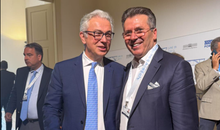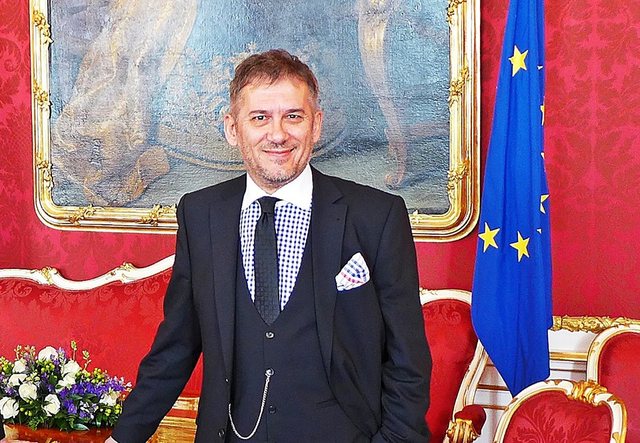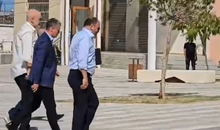
 Flash News
Flash News
Lobbying to become ambassador, Fate Velaj's case 'shakes' the Austrian Foreign Ministry; threat of a diplomatic scandal

The appointment of Fatmir Velaj as Albania's ambassador to Vienna in 2023 is turning into a diplomatic and political "powder keg" in the Foreign Ministry of Beate Meinl-Reisinger (Neos), placing the new federal government in an uncertain position, according to local media in Austria.
In 2024, a parliamentary investigation was requested by NEOS National Council member Helmut Brandstätter into Velaj's appointment as ambassador. The investigation shed light on several doubts regarding his suitability as a diplomatic figure.
Brandstätter, in the prepared investigation, wanted to know whether Velaj was a dual Austrian-Albanian citizen at the time of his appointment and whether he was engaged in commercial activity in Austria. Under current practice, both of these would be grounds for exclusion from accreditation as an ambassador to a third country.
"Is it true that the designated candidate is engaged in commercial activity in Austria? Would this be grounds for exclusion?"
"Is it known whether the designated candidate has renounced Austrian citizenship or would renounce it if appointed?"
At the time, there were suspicions that the then Federal Minister for EU Affairs and Constitutional Affairs, Karoline Edtstadler, had also intervened in Fate Velaj's appointment.
The issue has also put the Foreign Ministry at the center of criticism. The question is whether the Federal Ministry for Europe, Foreign Affairs and Integration (BMEIA) has already asked the Foreign Ministry in Tirana to appoint another candidate with a verbal note in July 2023 and whether this request has not been fulfilled to date. At that time, Alexander Schallenberg was Foreign Minister. Specific questions also arise in this regard:
“Which departments or individuals within the Federal Ministry for Europe, Media and Foreign Affairs made the decision regarding accreditation?”
"When and to what extent was Foreign Minister Alexander Schallenberg involved in the process?"
The suspicion arises that behind the appointment lies a murky web of political lobbying and diplomatic opportunism. The party-political entanglements in Austria, in particular, raise key questions. How did these state awards come about? Who initiated them and for what reason?
Investigation proves abuses – without consequences
Based on Foreign Minister Alexander Schallenberg's response to the investigation on July 24, 2024, new details emerged about the Velaj case.
The official response of the Foreign Ministry confirms the main allegations surrounding the appointment of Fatmir Velaj as Albania's ambassador to Vienna. According to the statement, the Albanian embassy requested a diplomatic agreement on July 27, 2023. The Federal Ministry for Europe, Foreign Affairs and International Affairs subsequently determined, during a routine review, that the nominee held both Austrian and Albanian citizenship and had previously engaged in commercial activities in Austria. Both of these were incompatible with the provisions of the Vienna Convention on Diplomatic Relations.
Only on March 19, 2024, did the Albanian embassy announce that Velaj had renounced his Austrian citizenship, officially paving the way for accreditation. On April 3, 2024, the Federal President granted him the agreement – based on the proposal of the Federal Ministry for Europe, Foreign Affairs and International Affairs. On June 26, 2024, Velaj finally submitted his credentials. This means: Despite years of working in Austria, despite his dual citizenship, and despite his commercial past, Velaj was diplomatically accredited – after the formal obstacles were removed through subsequent steps.
The Council of Ministers under pressure
Foreign Minister Meinl-Reisinger is under pressure. According to internal files of the Foreign Ministry, Velaj is said to have personally intervened in the Federal Ministry for Europe, Foreign Affairs and Security (BMEIA) on several occasions. In the interests of transparency and political hygiene, the entire process should be reexamined. The main question is whether there was any undue influence during her appointment as ambassador. If so, her dismissal would be almost inevitable.
Such a move would also have international implications. It could lead to diplomatic tensions with Tirana and cast a worrying light on the standards of Austrian foreign policy. This goes beyond any devious variant of "divide and rule."
Transparency is the order of the day
The parliamentary investigation touched an open wound. Why did the Federal Ministry for Europe, Foreign Affairs and Security hesitate for months to reject or confirm Velaj's appointment? Why was no alternative candidate proposed despite clear concerns? Who bears responsibility for this blatant disregard for diplomatic customs?
Albania is currently under pressure: just last month, the Albanian Special Prosecution Office arrested the mayor of Tirana, Erion Veliaj, on suspicion of bribery, money laundering, and concealment of income.
One thing is certain: many questions remain unanswered in the Velaj case. But one thing is already clear: if it turns out that an unsuitable candidate was appointed ambassador through political interference, a diplomatic scandal with significant consequences threatens. And one thing is equally certain: this issue cannot be dismissed simply with a smile from a foreign policy perspective.
Latest news


What does Zelenskyy have more than Zegjineja?
2025-07-05 18:45:26

Fiscal peace, but at a cost
2025-07-05 18:00:10
'Bankers' tax evasion, Chinese CEO and former director jailed
2025-07-05 17:39:21
Kyle Walker joins English club on two-year deal
2025-07-05 17:20:24
Two cars collide on the Saranda-Delvina axis, 4 injured
2025-07-05 17:05:29
Touching gesture! Liverpool will pay Jota's family's salary until 2027
2025-07-05 16:45:18
The zodiac signs that cheat most often
2025-07-05 16:25:53

"I asked for the dismissals", Dredha tries to soften Rama's 'blow' in Vlora
2025-07-05 15:48:49
Bomb threat in Parliament, prosecutor: It was a lie
2025-07-05 15:22:28

Bardhi: The recount revealed how greedy Zeqine Balluku is in stealing
2025-07-05 14:44:29
Knife wound on the secondary road Tirana-Durrës, perpetrator sought
2025-07-05 14:37:54
Tears and pain, Diogo Jota is escorted to his final home
2025-07-05 14:21:34
Success starts with yourself! Simple ways to invest in personal development
2025-07-05 13:58:50
Unlicensed firearms found in apartment, 50-year-old arrested in Lushnje
2025-07-05 13:43:11

Tirana Court remands Skerdi Sina to prison
2025-07-05 12:59:34
Cocaine laboratory in Greece, here are the Albanians arrested and wanted
2025-07-05 12:40:16
Directed Justice/Vangjeli: SPAK does not investigate any scandal involving Rama
2025-07-05 12:22:03

Bomb alert, Police remove MPs and media from Kosovo Parliament building
2025-07-05 11:48:16
"The will of the people" and the irony of ordered resignations
2025-07-05 11:32:05
Summer drowning risk: How to enjoy the water without risking your life
2025-07-05 11:20:27
Fire situation in the country, 16 fires reported in 24 hours, 4 still active
2025-07-05 11:07:04
Car hits pedestrian at white lines, injured in serious condition in Vlora
2025-07-05 10:59:58
Mosquito-borne diseases are a growing problem in Europe
2025-07-05 10:44:13



One of Sweden's most dangerous and wanted criminals arrested in Turkey
2025-07-05 09:38:29
Foreign exchange/ How much foreign currencies are bought and sold today
2025-07-05 09:18:38

"Don't be influenced by the opinions of others", today's horoscope
2025-07-05 08:40:50

Morning Post/ In 2 lines: What mattered yesterday in Albania
2025-07-05 08:02:07

Trump says he's ready to raise tariffs to 70% on some countries
2025-07-04 22:35:52
Tre shenjat e zodiakut që do ‘pasurohen’ në Korrik
2025-07-04 22:05:09
Gaza War: Hamas Accepts US Proposal for 60-Day Ceasefire
2025-07-04 21:50:10
Autocracy in Albania, Fuga: Governance has gotten out of control
2025-07-04 21:40:51
Meta: Agriculture on credit, the new fraud!
2025-07-04 21:26:39




Vote recount in Durrës ends without changes
2025-07-04 20:12:54
Gas station explodes in Rome, 25 injured (VIDEO)
2025-07-04 20:00:20

These afternoon habits often sabotage weight loss
2025-07-04 19:39:28
Former Arsenal player Thomas Partey accused of rape
2025-07-04 19:24:21
Shepherd disappears without a trace in Delvina
2025-07-04 19:14:31

Bardho gave Zegjine's mandate/Braho: Unfair! It violates the electoral system
2025-07-04 19:01:08


Rapid developments in the Sultanates!
2025-07-04 18:00:06



Italy tightens rules for skateboard traffic
2025-07-04 17:20:18

Unusual for the time, dense fog covers the coast of Vlora
2025-07-04 16:48:01


Accident on the Shkodra-Lezhë axis, one dead and 3 injured
2025-07-04 16:14:19
Albania with fewer requests for asylum and Albanian citizenship in 2024
2025-07-04 16:06:57

Albania last for quality of life, DP: Technical government is the solution!
2025-07-04 15:42:30
Nico Williams says "No" to Barcelona, signs with Athletic Club until 2035
2025-07-04 15:33:35
Fires in the country, four fires are still active, what is the situation?
2025-07-04 15:24:20

Summer brings big changes for these 4 zodiac signs
2025-07-04 15:00:04
Osmani: MPs need to agree to a secret ballot for the Speaker of Parliament
2025-07-04 14:51:09
Serious accident on the Peqin-Elbasan axis, two injured
2025-07-04 14:37:56

GJKKO leaves in force the security measure for the head of the KPP
2025-07-04 13:58:17
Who will replace Ilir Meta and take over the leadership of the PL?
2025-07-04 13:50:36
Berisha: Dismissal of directors in Vlora, another act of 'scapegoats'
2025-07-04 13:41:46




Librazhd/ In a serious psychological state, the young man consumes pesticides
2025-07-04 13:05:07


Weapons trafficked from Kosovo to Albania, two arrested, 8 pistols seized
2025-07-04 12:33:28
Konsumimi i tepërt i çokollatës, ja cilat janë dëmet që shkakton në organizëm
2025-07-04 12:23:35

Fires in the country, 21 fires in the last 24 hours, 4 still active
2025-07-04 12:00:19
WB calls for debt transparency: Albania to publish details of every loan
2025-07-04 11:50:05
Changes in the State Police, new names expected to lead 5 police stations
2025-07-04 11:40:06

The race for the head of the BKH, the third phase on July 11
2025-07-04 11:20:23

Toxic phrases that show your relationship is in trouble
2025-07-04 11:00:10

